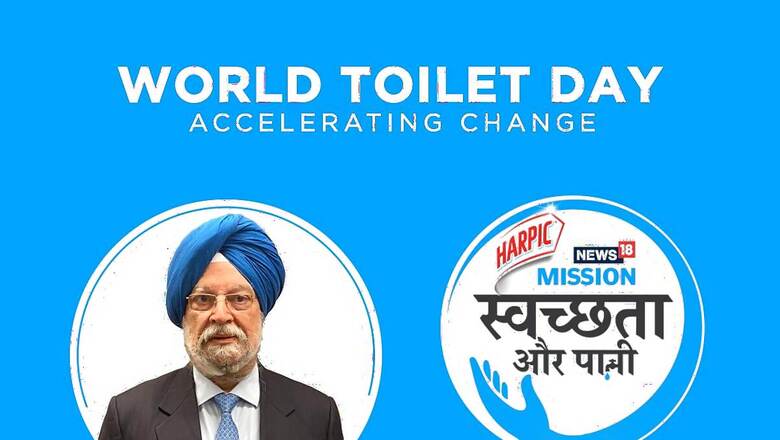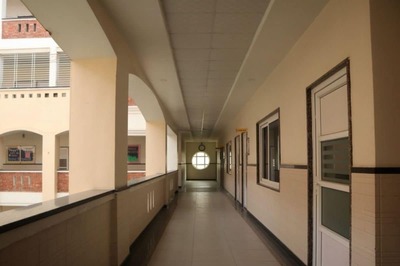
views
The World Toilet Day, marked on November 19 every year, is a significant day for India. People may scoff at the idea that such an occasion is being given such prominence, but there is good reason for making this claim. It is only when one lifts the bottom of the pyramid that substantial growth can be achieved at the national level. The Swachh Bharat Mission did just that for India. Toilets have been the centrepiece of this mission and are the foundational infrastructure that have ameliorated myriad sanitation and hygiene concerns. That is why the toilet is such an important symbol in India’s growth story.
No trend encapsulates the growth of India as well as the Swachhata movement. Only 37% of India was Open Defecation Free (ODF) in 2014. This was the state of our affairs that led Shri Narendra Modiji to issue a clarion call for sanitation to become the nation’s foremost priority in his first Independence Day address as the Prime Minister. 130 crore citizens rose up in response to script the world’s largest behavioural change movement under the Swachh Bharat Mission and other government initiatives. By 2nd October 2019 — Mahatma Gandhiji’s 150th Jayanti — India had achieved near saturation through a record construction of toilets. In only nine years since our collective pledge, more than 12 crore toilets have been constructed across rural and urban India.
In our cities and towns, the mission has overseen the construction of 63 lakh individual toilets and 6.3 lakhs public toilets in our urban areas – both figures well above the stated targets of the mission. Today, more than 76% of the total waste generated in urban areas is being processed, as compared to a dismal 17% in 2014. Other initiatives such as AMRUT have tackled the shortage of basic sanitation infrastructure by adding 172 lakh water tap connections and 135 lakh sewer connections across cities in the country.
Notably, the mission has enhanced the dignity of women and girls. Even as we have promoted women-friendly toilets, we have formalised the involvement of casual workers, and encouraged women-led enterprises in sanitation. A World Bank study stated that the Swacch Bharat Mission saved lives of at least 3 lakh people and avoided at least 14 million Disability Adjusted Life Years (DALY). Most of these benefits were realised by women in every household. A UNICEF report stated that the poor were saving Rs 50,000 more every year because of the benefits of toilet construction and safe sanitation practices.
In 1916, the Mahatma had lamented in his address at the Benares Hindu University that there could be no true freedom if we continued to live without respecting our own health and environment. It took more than 100 years for his dream to come to fruition. While the final thrust came after 2014, many state and local initiatives paved the way. The ‘Nirmal Gujarat’ programme, launched in 2005 under the stewardship of then Chief Minister Modi ji, is a case in point. It synergized Gandhiji’s ideals with the belief that universal sanitation is the fulcrum for development. The programme promoted community participation, women’s leadership, and a demand-driven approach.
It was the kind of innovative governance that was to lay the guidelines for the Swachh Bharat Mission. The end results have been spectacular – 100% door-to-door collection of waste is now being practiced in 90,935 wards – 95.6% of the total number of wards in India. 88.58% of all wards, i.e., 84,258 wards, practice 100% source segregation of waste, thus enabling us to be more efficient across the waste value chain. Already, 25% of our cities have achieved ODF++ certification, reflecting our commitment to safe waste management.
The Swachh Bharat Mission has now become a much larger movement as it aims to make our cities ‘garbage free’ by 2026 and remediate all legacy waste dumpsites. The mission has spurred sanitation innovations, industry growth, and private sector investment in the sector. Above all, there is unprecedented public enthusiasm. This second phase of the mission is witnessing public participation on an unprecedented scale. Last month, we saw massive cleanliness drives across the country in response to the Hon’ble Prime Minister’s Call to Action on 1st October 2023. Owned and led by citizens, these cleanliness drive involved the participation of 87.5 million citizens who offered shramdaan at over 9 lakh sites.
Even as we celebrate these achievements, there are still many challenges ahead of us. As city boundaries expand, it is important to address the issue of last-mile connectivity. And while we have exceeded our targets for community and public toilets, there is a clear demand for additional public toilets to serve emerging needs. The second phase of Swachh Bharat is proactively addressing these challenges. Rs. 3,018 crores have been sanctioned for the construction of toilets. Additionally, 23,465 ‘Aspirational toilet’ blocks are being set up in prominent public places at a cost of Rs 445.35 crores.
Each rupee invested in sanitation saves households 4.3 times that amount in medical expenses. Limited access to toilets poses health risks, particularly to young children and women. Inadequate sanitation also affects education, as many schools lack proper toilets, especially critical for girls during menstruation. Improving sanitation infrastructure is essential for India’s health, economy, social welfare, and educational sectors, particularly benefiting women and children.
As we commemorate World Toilet Day 2023, we are reminded of the critical juncture at which we stand. This year’s theme, ‘Accelerating Change,’ is a call to action. Sanitation is more than a convenience; it is a human right. Let us use this World Toilet Day to renew our commitment to providing safe sanitation for all. Let us accelerate our efforts, work collaboratively, and innovate tirelessly. This is not just our goal; it is our moral imperative.
Hardeep Singh Puri is Union Minister for Housing & Urban Affairs & Minister for Petroleum and Natural Gas. Views expressed in the above piece are personal and solely that of the author. They do not necessarily reflect News18’s views.




















Comments
0 comment